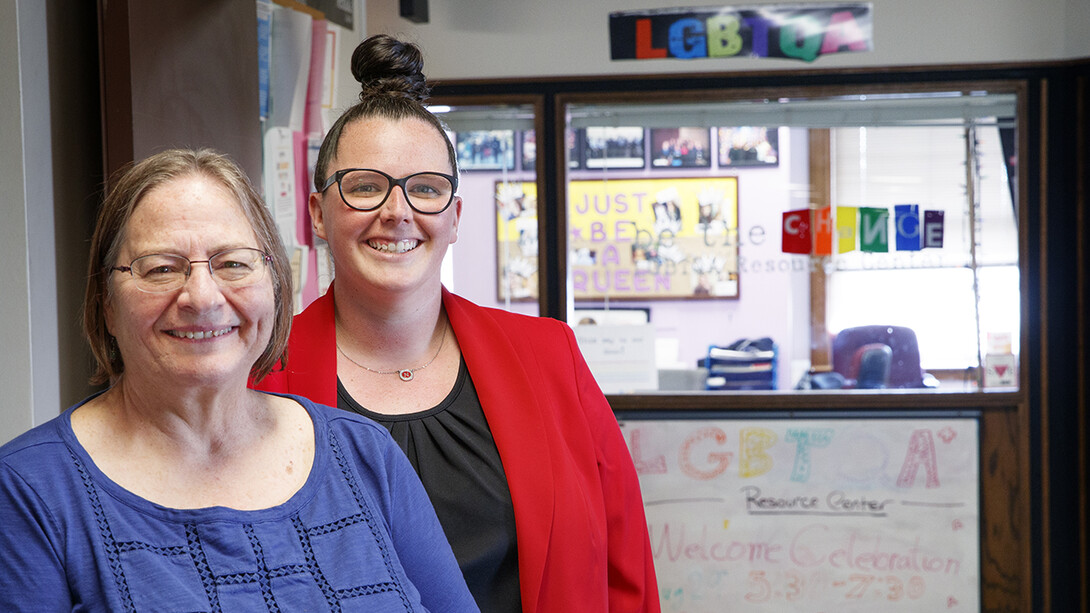
Located on the third floor of the Nebraska Union, the university’s LGBTQA+ Resource and Women’s Centers have a long history of supporting Huskers of all identities, experiences and backgrounds.
That support is getting an extra boost this fall with the addition of the Center for Advocacy, Response and Education, formerly Victim Advocacy, next to the two organizations in room 345. CARE made the move to the third floor on Aug. 20, and it’s ready to start helping students in a new and enhanced way.
“Moving to room 345, with its location between the Women’s Center and LGBTQA+ Center, made perfect sense to us. We saw a great opportunity for increased collaboration on programming and services related to sexual, relationship and gender-based violence on campus,” said Kara Brant, associate director for support and advocacy at Student Affairs.
CARE was previously housed in the University Health Center. With updated headquarters in one of the most well-traveled and central buildings on campus, it hopes to become more accessible for all students, faculty and staff.

Though the Nebraska Union is a busy hub for campus life, Brant adds that CARE’s third-floor location will offer continued privacy for those seeking help. Most of the Nebraska Union doesn’t have a third floor, meaning that there is significantly less foot traffic near the center.
“When you think about the individuals that are coming to CARE for help, some might not want to do that in the most visible of places,” Brant said.
This year, CARE will continue to provide confidential support for students, faculty and staff who have experienced sexual assault, domestic and dating violence, stalking, harassment and other crimes.
With the help of a trained advocate, members of the campus community can process a situation, plan for safety, access temporary housing on campus, navigate reporting options, receive academic modifications and be accompanied to interviews and appointments.
Along with directly supporting students in times of crisis, CARE advocates also work on the preventative and educational side of sexual assault awareness. They currently offer training workshops for organizations around campus — and that expanded mission is part of the reason why the organization’s name changed this summer.
“The name Victim Advocacy didn’t encompass all of the prevention and outreach efforts that we began engaging with last year. Center for Advocacy, Response and Education is much more holistically representative of the services that we are now offering to campus,” Brant said.
“We also wanted to take the focus away from the word ‘victim.’ Although some students identify with the word, others don’t, and we wanted to make sure our name respected that.”

Pat Tetreault, director of the LGBTQA+ Resource and Women’s Centers, is excited bring a more inclusive perspective to the issue of campus safety at Nebraska. The addition of CARE next to the two centers, she says, will create an even more compassionate community space where students can feel accepted, heard and comfortable.
“Violence impacts everyone — all identities, either directly or indirectly. So being able to raise awareness about that, and also providing people with the tools and skills to develop healthier relationships and cope with and manage things that they or someone they care about experiences, is really important,” Tetreault said.
CARE will host an open house from 4 to 6 p.m. Sept. 10 in room 345. The three organizations are also planning to collaborate next month during World Without Violence week, which is part of Domestic Violence Awareness Month in October.
Students, faculty and staff in need of help can contact CARE by emailing victimadvocate@unl.edu, calling 402-472-3553 or visiting room 345 in the Nebraska Union.
Learn more about other resources offered by campus and the Lincoln community here.







